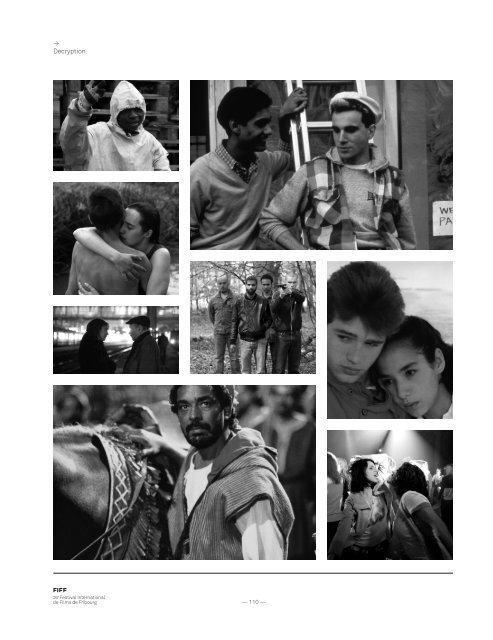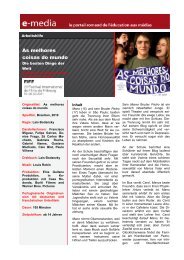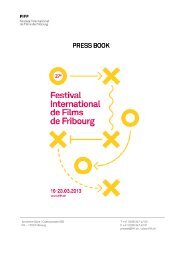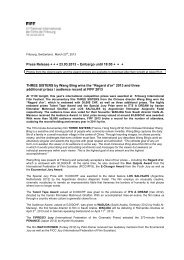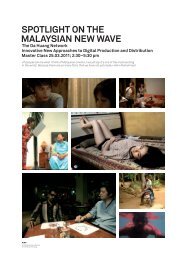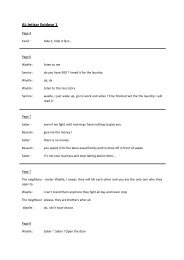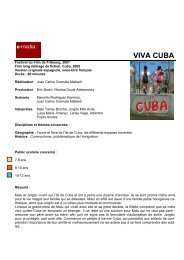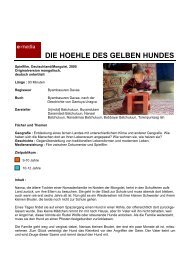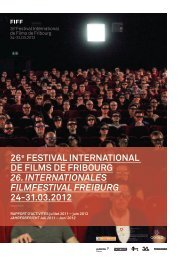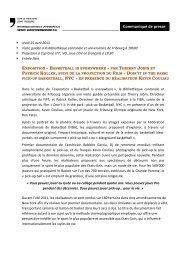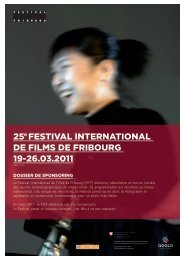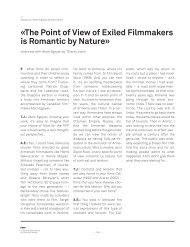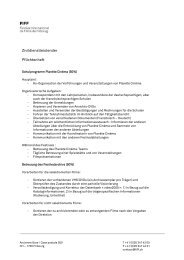→ Decryption - Festival International de Film de Fribourg
→ Decryption - Festival International de Film de Fribourg
→ Decryption - Festival International de Film de Fribourg
You also want an ePaper? Increase the reach of your titles
YUMPU automatically turns print PDFs into web optimized ePapers that Google loves.
<strong>→</strong><br />
<strong>Decryption</strong><br />
— 110 —
<strong>→</strong><br />
Parallel Section<br />
<strong>Decryption</strong><br />
The Image of Islam in the Occi<strong>de</strong>nt<br />
Décryptage<br />
L’image <strong>de</strong> l’Islam en Occi<strong>de</strong>nt<br />
Entschlüsselt!<br />
Das Bild <strong>de</strong>s Islam im Okzi<strong>de</strong>nt<br />
— 111 —
<strong>→</strong><br />
<strong>Decryption</strong> | Orient and Occi<strong>de</strong>nt: A Relationship Marked by I<strong>de</strong>alisation and Mistrust<br />
Orient and Occi<strong>de</strong>nt:<br />
A Relationship Marked by I<strong>de</strong>alisation<br />
and Mistrust<br />
Prof. Dr. Mariano Delgado, Dean of the Theology Faculty of the University of Freiburg<br />
E | The relationship between Orient<br />
and Occi<strong>de</strong>nt has always<br />
been marked by i<strong>de</strong>alisation and<br />
mistrust. Numerous aca<strong>de</strong>mic<br />
and cinematographic initiatives<br />
have been un<strong>de</strong>rtaken to improve<br />
mutual un<strong>de</strong>rstanding and<br />
overcome the powerful ten<strong>de</strong>ncy<br />
towards polarisation. Almost<br />
indispensable for the success of<br />
these en<strong>de</strong>avours is an awareness<br />
of the century-old myths<br />
that <strong>de</strong>termine both si<strong>de</strong>s’ selfperception<br />
and perception of the<br />
other. In the following, I therefore<br />
wish to outline the most<br />
important typologies of relations<br />
between the Orient and Occi<strong>de</strong>nt,<br />
past and present.<br />
The Orient as Seen by<br />
the Occi<strong>de</strong>nt<br />
The Barbarian Invasion. The perception<br />
of the East as a threat to<br />
our civilisation is <strong>de</strong>eply rooted in<br />
the collective consciousness of<br />
the West. The notion goes back<br />
to the Ancient Greeks and the<br />
Battle of Thermopylae in the 5th<br />
century BC. It was further coined<br />
by the Battle of Poitiers in the<br />
8th century, the fear of Mongols<br />
and Turks throughout the Middle<br />
Ages, Spain’s struggle against the<br />
Muslims, the Battle of Lepanto in<br />
the 16th century, the repulsion of<br />
the Sieges of Vienna in the 16th<br />
and 18th century and the Russian<br />
wars against the Tartars. In<br />
this context, the controversial<br />
French intellectual Roger Garaudy<br />
emphasises the acci<strong>de</strong>ntal<br />
nature of the Western victories<br />
and speaks of a “complex” of the<br />
Western world. Garaudy goes<br />
even further, saying he would<br />
have preferred a victory of the<br />
East, which in his view was culturally<br />
superior to the West.<br />
Since our history had the East<br />
been victorious, would have taken<br />
a different course – a better<br />
and more civilised one, Garaudy<br />
claims – he refers to the Occi<strong>de</strong>nt<br />
as the “Acci<strong>de</strong>nt”, a fortuitous<br />
product of world history. Garaudy’s<br />
thesis is provocative. But<br />
it is also a reversal of the perception<br />
of the East as a potential<br />
menace, as a “barbarian invasion”.<br />
Both motives are still very<br />
much alive today: while some<br />
people react with cultural pessimism<br />
to the growing presence of<br />
Muslims in Western Europe and<br />
conjure up the ghost of “Eurabia”,<br />
others consi<strong>de</strong>r it a welcome op-<br />
— 112 —<br />
portunity to stress the frequently<br />
disregar<strong>de</strong>d contribution of Islam<br />
to European culture.<br />
Magic of the Orient. The West has<br />
always admired the refined culture<br />
of the East, the lifestyle,<br />
the hospitality, the love poetry<br />
and the allure of the feminine.<br />
A classic example of this is the<br />
“Tales of the Arabian Nights”, a<br />
collection of oriental tales and<br />
also a classic of world literature.<br />
Attracted by the magic of<br />
the Orient, Goethe rehabilitated<br />
the Arabian prophet in “The Song<br />
of Mahomet” (1772/1773). The<br />
West was interested in the East<br />
because it felt attracted to it. In<br />
the early mo<strong>de</strong>rn period, numerous<br />
chairs were established in<br />
Western Europe for the study of<br />
Arabic as well as other cultures<br />
and languages of the Islamic<br />
world. The Quran was translated<br />
into European languages and the<br />
first Arabic edition in print was<br />
produced in Europe. Diplomats,<br />
tra<strong>de</strong>rs and even clerics reported<br />
on their travels and painted a<br />
diversified picture of the Islamic<br />
world. Nothing similar can be<br />
found in Islamic culture, which –<br />
much like the Chinese – seemed
<strong>→</strong><br />
<strong>Decryption</strong> | Orient and Occi<strong>de</strong>nt: A Relationship Marked by I<strong>de</strong>alisation and Mistrust<br />
to hold little interest in foreign<br />
matters.<br />
Whilst Napoleon’s Egyptian campaign<br />
(1798) further increased<br />
Western interest in all Oriental<br />
matters, the purpose of the latter<br />
changed: mere curiosity turned<br />
into a <strong>de</strong>sire to dominate and indoctrinate.<br />
This approach to the<br />
Islamic world has been <strong>de</strong>fined<br />
as “Orientalism”, a concept that<br />
Edward W. Said analysed critically<br />
in 1978.<br />
The Occi<strong>de</strong>nt as Seen by<br />
the Orient<br />
The Myth of the Crusa<strong>de</strong>r. The<br />
Orient is also used to perceiving<br />
the Occi<strong>de</strong>nt as a threat. Every<br />
civilisation needs its “barbarians”<br />
as a mirror. For the Orient, these<br />
are the “crusa<strong>de</strong>rs”. As a historical<br />
figure from the Middle Ages,<br />
they symbolise the West’s <strong>de</strong>termination<br />
not only to <strong>de</strong>fend itself<br />
against Islam, but to conquer it.<br />
The mediaeval campaigns of conquest<br />
led by crusa<strong>de</strong>rs are firmly<br />
anchored in the Islamic mind.<br />
The West’s attempt to gain a permanent<br />
foothold in the Islamic<br />
world by establishing so-called<br />
Crusa<strong>de</strong>r states constitutes a<br />
trauma that has cast its shadow<br />
on the interpretation of many<br />
conflicts of our time: the Algerian<br />
War, the Palestine conflict,<br />
the Iran conflict, the Afghanistan<br />
and Iraq conflict and even the issue<br />
of possible Turkish accession<br />
to the European Union. There’s<br />
hardly a conflict between Islamic<br />
and Western countries in which<br />
Westerners are not i<strong>de</strong>ntified as<br />
the new “crusa<strong>de</strong>rs”. The mirrorimage<br />
of the crusa<strong>de</strong>r myth can<br />
be found not only among violent<br />
Islamists who have <strong>de</strong>clared war<br />
on the <strong>de</strong>ca<strong>de</strong>nt West, but also<br />
among those mo<strong>de</strong>rate Islamists<br />
who, on the principle of “Europe<br />
is the problem, Islam the solution”,<br />
propagate the aggressive<br />
dissemination of Islam in Europe<br />
in disregard of the latter’s secular<br />
and religious values (human<br />
dignity, gen<strong>de</strong>r equality, religious<br />
freedom, separation of politics<br />
and religion).<br />
The Myth of Al-Andalus. Mediaeval<br />
Islamic Spain, known by<br />
Muslims as “Al-Andalus”, has often<br />
been glorified as a mythical<br />
interreligious and intercultural<br />
paradise. Such i<strong>de</strong>alisation lives<br />
on, for instance, in the Three<br />
— 113 —<br />
Cultures Museum that the Roger<br />
Garaudy Foundation has<br />
opened with the support of the<br />
Andalusian government. This<br />
i<strong>de</strong>ological transfiguration is<br />
present throughout the Islamic<br />
world, and not only among the<br />
violent fundamentalists of Al-<br />
Qaeda or Hamas who, in their<br />
schools and on their homepages,<br />
incite youth to re-conquer<br />
Al-Andalus. Many Western intellectuals<br />
have also adopted such<br />
a view. Among the Spanish Left,<br />
for example, it is customary to<br />
regret the <strong>de</strong>mise of Al-Andalus<br />
on the grounds that it was<br />
more tolerant and cultivated<br />
than Christian Spain. However,<br />
a closer examination of historical<br />
reality reveals that the myth<br />
of Muslims, Jews and Christians<br />
living together peacefully in mediaeval<br />
Spain has to be exposed<br />
as such. A constantly threatened<br />
cohabitation based on toleration<br />
of the religious and cultural minorities<br />
by the ruling majority, is<br />
not the same as a coexistence of<br />
all religions and cultures on the<br />
terra firma of mo<strong>de</strong>rn “religious<br />
freedom”. Hence, in situations of<br />
social, political or religious unrest,<br />
this toleration of the other
<strong>→</strong><br />
<strong>Decryption</strong> | Orient and Occi<strong>de</strong>nt: A Relationship Marked by I<strong>de</strong>alisation and Mistrust<br />
often abruptly yiel<strong>de</strong>d to persecution<br />
and violence.<br />
The Problems of Intercultural<br />
Life<br />
The presented patterns of the relationship<br />
between Orient and<br />
Occi<strong>de</strong>nt form the basis for a<br />
better un<strong>de</strong>rstanding of many<br />
contemporary films. However,<br />
the latter frequently explore<br />
a different, more mo<strong>de</strong>rn theme,<br />
namely living between several<br />
cultures: films, for example,<br />
about migrants from the East<br />
who come to Europe where they<br />
achieve a painful but also liberating<br />
synthesis between Orient<br />
and Occi<strong>de</strong>nt, between tradition<br />
and mo<strong>de</strong>rnity; or films about<br />
migrants within the Islamic world<br />
itself who migrate, for example,<br />
from the villages of Anatolia<br />
to Istanbul and who also have to<br />
reconcile their agrarian traditions<br />
with urban living. These migratory<br />
movements have transformed<br />
our countries into multicultural<br />
and multi-religious societies.<br />
Some people react by adopting<br />
the pattern of the “barbarian invasion”,<br />
thus reinforcing the other<br />
si<strong>de</strong>’s “crusa<strong>de</strong>r syndrome”. Others<br />
react calmly and perceive the<br />
pluralism of cultures and religions<br />
as an enriching factor.<br />
Life between different cultures<br />
has become typical of our time.<br />
It has consequences not only for<br />
mentalities, lifestyles and customs,<br />
but also for the conception<br />
of Islam itself. The latter now has<br />
to find its place between tradition<br />
and mo<strong>de</strong>rnity.<br />
Translation: Tim Chafer<br />
— 114 —
<strong>→</strong><br />
Décryptage | Orient et Occi<strong>de</strong>nt : Entre idéalisation et méfiance<br />
Orient et Occi<strong>de</strong>nt :<br />
Entre idéalisation et méfiance<br />
Prof. Dr. Mariano Delgado, Doyen <strong>de</strong> la Faculté <strong>de</strong> Théologie <strong>de</strong> l’Université <strong>de</strong> <strong>Fribourg</strong><br />
F | Depuis toujours, le rapport<br />
entre Orient et Occi<strong>de</strong>nt a été<br />
marqué par la méfiance et l’idéalisation.<br />
De nombreuses initiatives,<br />
tant au niveau scientifique<br />
que cinématographique, œuvrent<br />
pour une meilleure compréhension<br />
mutuelle et cherchent<br />
à vaincre la forte polarisation<br />
existante. Dans l’optique d’une<br />
réflexion aboutie, la connaissance<br />
<strong>de</strong>s mythes pluriséculaires<br />
<strong>de</strong> la perception <strong>de</strong> soi<br />
et <strong>de</strong>s autres constitue un élément<br />
quasiment incontournable.<br />
Voilà pourquoi il est nécessaire<br />
d’exposer brièvement la typologie<br />
<strong>de</strong>s rapports entre Orient et<br />
Occi<strong>de</strong>nt au cours <strong>de</strong> l’Histoire et<br />
jusqu’à aujourd’hui.<br />
L’Orient du point <strong>de</strong> vue <strong>de</strong><br />
l’Occi<strong>de</strong>nt<br />
Les invasions barbares. Elément<br />
constant dans la conscience collective<br />
occi<strong>de</strong>ntale, l’Orient est<br />
considéré comme une menace<br />
pour notre civilisation. Une perception<br />
qui remonte à la Grèce<br />
Antique et à la bataille <strong>de</strong>s Thermopyles<br />
au 5 e siècle avant Jésus-<br />
Christ. Vint ensuite la bataille <strong>de</strong><br />
Poitiers au 8 e siècle, la peur <strong>de</strong>s<br />
Mongols et <strong>de</strong>s Turcs, la lutte<br />
<strong>de</strong> l’Espagne chrétienne contre<br />
les Musulmans, la bataille <strong>de</strong><br />
Lépante au 16 e siècle, la résistance<br />
contre les Turcs lors du<br />
siège <strong>de</strong> Vienne au 16 e puis au<br />
18 e siècle, les guerres menées<br />
par les Russes contre les Tartares<br />
: autant d’événements qui ont<br />
marqué la perception occi<strong>de</strong>ntale<br />
<strong>de</strong> l’Orient. Intellectuel français<br />
controversé, Roger Garaudy<br />
parle d’un « complexe » <strong>de</strong>s pays<br />
occi<strong>de</strong>ntaux et souligne le caractère<br />
aléatoire <strong>de</strong> leurs victoires.<br />
Il aurait d’ailleurs préféré voir<br />
l’Orient triompher <strong>de</strong> l’Occi<strong>de</strong>nt<br />
lors <strong>de</strong> ces batailles fatidiques,<br />
le premier étant selon lui culturellement<br />
bien supérieur au<br />
second. Si l’Orient avait triomphé,<br />
notre histoire aurait pris un autre<br />
cours, d’après Roger Garaudy, un<br />
cours meilleur et plus civilisé.<br />
Pour cette raison, il définit l’Occi<strong>de</strong>nt<br />
comme un « acci<strong>de</strong>nt », pur<br />
fruit du hasard <strong>de</strong> l’Histoire. La<br />
thèse du philosophe français est<br />
une provocation. Mais elle offre<br />
l’image inversée <strong>de</strong> la perception<br />
occi<strong>de</strong>ntale <strong>de</strong> l’Orient comme<br />
un danger potentiel, comme une<br />
possible « invasion barbare ». Ces<br />
<strong>de</strong>ux conceptions se retrouvent<br />
jusqu’à aujourd’hui : alors que<br />
— 115 —<br />
certains réagissent <strong>de</strong> manière<br />
pessimiste, d’un point <strong>de</strong> vue<br />
culturel, à la présence grandissante<br />
<strong>de</strong> Musulmans en Europe<br />
<strong>de</strong> l’Ouest et agitent le spectre <strong>de</strong><br />
l’« Eurabie », d’autres y voient au<br />
contraire une chance <strong>de</strong> souligner<br />
la contribution maintes fois<br />
passée sous silence <strong>de</strong> l’Islam à<br />
la culture européenne.<br />
La magie <strong>de</strong> l’Orient. Les Occi<strong>de</strong>ntaux<br />
ont toujours admiré le<br />
raffinement <strong>de</strong> la culture orientale,<br />
le style <strong>de</strong> vie qui y est associé,<br />
l’hospitalité, la poésie amoureuse<br />
ou le pouvoir d’attraction<br />
du féminin. L’œuvre <strong>de</strong>s Mille et<br />
Une Nuits, recueil <strong>de</strong> contes du<br />
Levant mais aussi grand classique<br />
<strong>de</strong> la littérature mondiale, en<br />
est un exemple éclatant. Attiré<br />
par son caractère magique,<br />
Goethe, dans le Chant <strong>de</strong> Mahomet<br />
(1172/1773), a ainsi réhabilité<br />
le prophète arabe. Attiré par<br />
l’Orient, l’Occi<strong>de</strong>nt s’y est intéressé.<br />
Ainsi, dès le début <strong>de</strong>s<br />
temps mo<strong>de</strong>rnes, <strong>de</strong> nombreuses<br />
chaires consacrées à l’étu<strong>de</strong> <strong>de</strong><br />
l’arabe – et d’autres cultures et<br />
langues importantes du mon<strong>de</strong><br />
musulman – ont été mises en<br />
place. Le Coran a été traduit dans
<strong>→</strong><br />
Décryptage | Orient et Occi<strong>de</strong>nt : Entre idéalisation et méfiance<br />
plusieurs langues européennes<br />
et le premier exemplaire en<br />
arabe a même été imprimé en<br />
Europe. Diplomates, commerçants,<br />
mais aussi gens d’église,<br />
ont rapporté <strong>de</strong>s récits <strong>de</strong> leurs<br />
voyages en Orient, livrant une<br />
image nuancée du mon<strong>de</strong> islamique.<br />
Rien <strong>de</strong> semblable dans la<br />
culture musulmane qui, pareille<br />
à la culture chinoise, ne semble<br />
pas s’être intéressée aux civilisations<br />
étrangères. Toutefois, avec<br />
la campagne d’Egypte <strong>de</strong> Napoléon<br />
(1798), l’intérêt occi<strong>de</strong>ntal<br />
pour l’Orient se transformera en<br />
doctrine <strong>de</strong> l’« orientalisme et<br />
du colonialisme », qui consiste<br />
à dominer et à étudier le mon<strong>de</strong><br />
musulman dans le but <strong>de</strong> lui<br />
dicter la manière dont il <strong>de</strong>vrait<br />
appréhen<strong>de</strong>r sa propre culture.<br />
Comme on le sait, Edward W.<br />
Said s’est positionné <strong>de</strong> manière<br />
critique à cet égard.<br />
L’Occi<strong>de</strong>nt du point <strong>de</strong> vue<br />
<strong>de</strong> l’Orient<br />
Le mythe du croisé. L’Orient a<br />
également pour habitu<strong>de</strong> <strong>de</strong><br />
considérer l’Occi<strong>de</strong>nt comme<br />
une menace. Toute civilisation a<br />
d’ailleurs besoin <strong>de</strong> pouvoir se<br />
refléter dans ses propres « bar-<br />
bares ». Pour l’Orient, il s’agit <strong>de</strong>s<br />
« croisés ». Personnages historiques<br />
issus du Moyen Âge, ils<br />
symbolisent la volonté <strong>de</strong> l’Occi<strong>de</strong>nt<br />
non seulement <strong>de</strong> se protéger<br />
contre l’Islam mais aussi<br />
<strong>de</strong> conquérir l’Orient. Ces croisa<strong>de</strong>s<br />
conquérantes du Moyen Âge<br />
sont profondément ancrées dans<br />
la conscience collective islamique.<br />
La tentative <strong>de</strong> l’Occi<strong>de</strong>nt <strong>de</strong><br />
pénétrer durablement le mon<strong>de</strong><br />
musulman en y créant <strong>de</strong>s<br />
« Etats latins d’Orient » constitue<br />
un traumatisme qui marque l’interprétation<br />
<strong>de</strong> bon nombre <strong>de</strong><br />
conflits actuels : la guerre d’Algérie,<br />
les conflits en Palestine<br />
et en Iran, les guerres en Irak et<br />
en Afghanistan voire même le<br />
problème que pose l’éventuelle<br />
adhésion <strong>de</strong> la Turquie à l’Union<br />
Européenne. Il n’existe pas <strong>de</strong><br />
conflit entre pays occi<strong>de</strong>ntaux<br />
et pays musulmans où les Occi<strong>de</strong>ntaux<br />
ne soient pas qualifiés<br />
<strong>de</strong> nouveaux « croisés ». L’image<br />
inversée du mythe du croisé se<br />
retrouve non seulement auprès<br />
<strong>de</strong>s islamistes violents, ceux<br />
qui ont déclaré la guerre à l’Occi<strong>de</strong>nt<br />
et à sa déca<strong>de</strong>nce, mais<br />
aussi auprès <strong>de</strong>s islamistes plus<br />
modérés, qui, suivant le mot d’or-<br />
— 116 —<br />
dre « L’Europe constitue le problème,<br />
l’Islam est la solution »,<br />
mènent en Europe une islamisation<br />
agressive qui méprise<br />
ses principes séculaires et ses<br />
valeurs religieuses (respect <strong>de</strong><br />
la dignité humaine, égalité <strong>de</strong>s<br />
sexes, liberté <strong>de</strong> culte, séparation<br />
<strong>de</strong> la politique et <strong>de</strong> la religion).<br />
Le mythe d’Al-Andalus. L’Espagne<br />
islamique du Moyen Âge, « Al-<br />
Andalus » pour les Musulmans, a<br />
souvent été idéalisée comme un<br />
paradis pluriculturel et pluriconfessionnel.<br />
Une telle idéalisation<br />
se ressent clairement, par exemple<br />
au Musée <strong>de</strong>s Trois Cultures<br />
que la fondation Roger Garaudy a<br />
ouvert à Cordoue avec le soutien<br />
du gouvernement andalou. Elle<br />
est aussi très présente dans l’ensemble<br />
du mon<strong>de</strong> musulman, et<br />
pas uniquement auprès <strong>de</strong>s fondamentalistes<br />
extrémistes d’Al-<br />
Qaïda ou du Hamas, qui, par le<br />
biais <strong>de</strong> leurs écoles et <strong>de</strong> leurs<br />
sites web, incitent la jeunesse à<br />
reconquérir Al-Andalus. Nombre<br />
d’intellectuels occi<strong>de</strong>ntaux ont<br />
intériorisé, eux aussi, cette vision<br />
<strong>de</strong>s choses. Ainsi, il est traditionnellement<br />
<strong>de</strong> bon ton au sein <strong>de</strong><br />
la gauche espagnole <strong>de</strong> regretter<br />
la fin d’Al-Andalus, société
<strong>→</strong><br />
Décryptage | Orient et Occi<strong>de</strong>nt : Entre idéalisation et méfiance<br />
plus cultivée et plus tolérante<br />
que l’Espagne chrétienne. Si l’on<br />
se penche toutefois sur la réalité<br />
historique, le mythe d’une cohabitation<br />
pacifique entre Musulmans,<br />
Juifs et Chrétiens dans<br />
l’Espagne du Moyen Âge ne tient<br />
pas. Il s’agissait en fait d’une<br />
entente constamment menacée,<br />
qui reposait sur une tolérance<br />
vis-à-vis <strong>de</strong>s minorités culturelles<br />
et religieuses par la majorité<br />
au pouvoir, tel que c’est le cas<br />
aujourd’hui encore dans <strong>de</strong> nombreux<br />
pays musulmans. Mais en<br />
aucun cas il ne s’agissait d’une<br />
cohabitation <strong>de</strong> toutes les religions<br />
et <strong>de</strong> toutes les cultures<br />
au sens mo<strong>de</strong>rne <strong>de</strong> la « liberté<br />
religieuse ». En cas <strong>de</strong> revirement<br />
politique, social ou religieux,<br />
cette tolérance pouvait en effet<br />
se transformer en persécution et<br />
en violence.<br />
Une vie interculturelle difficile<br />
La typologie <strong>de</strong>s rapports entre<br />
Orient et Occi<strong>de</strong>nt présentée ci<strong>de</strong>ssus<br />
est la base <strong>de</strong> la compréhension<br />
<strong>de</strong> nombreux films<br />
contemporains. Dans ces films<br />
apparaît souvent un autre motif,<br />
plus mo<strong>de</strong>rne, à savoir le caractère<br />
délicat que représente une<br />
vie entre les cultures : cela touche<br />
les migrants venus d’Orient qui<br />
s’installent en Europe et doivent<br />
procé<strong>de</strong>r à une synthèse entre<br />
Orient et Occi<strong>de</strong>nt, entre tradition<br />
et mo<strong>de</strong>rnité, moment personnel,<br />
douloureux mais aussi<br />
libérateur. De manière analogue,<br />
les migrants au sein du mon<strong>de</strong><br />
musulman doivent eux aussi<br />
faire face à cette difficulté, à<br />
l’instar <strong>de</strong>s habitants <strong>de</strong>s villages<br />
d’Anatolie qui partent s’installer<br />
à Istanbul, obligés <strong>de</strong> faire la<br />
synthèse entre le mon<strong>de</strong> agraire<br />
traditionnel et la vie urbaine. Les<br />
mouvements migratoires ont<br />
transformé nos pays en sociétés<br />
multiculturelles et pluriconfessionnelles.<br />
Certains réagissent à<br />
ce phénomène selon le modèle<br />
<strong>de</strong>s « invasions barbares », renforçant<br />
ainsi dans l’autre camp le<br />
« syndrome du croisé ». D’autres<br />
réagissent <strong>de</strong> manière plus<br />
sereine et voient dans le pluralisme<br />
<strong>de</strong>s religions et <strong>de</strong>s cultures<br />
un enrichissement. Cette<br />
vie entre les cultures est <strong>de</strong>venue<br />
l’expression même <strong>de</strong> notre<br />
temps. Elle a <strong>de</strong>s répercussions<br />
non seulement sur notre mentalité,<br />
sur notre style <strong>de</strong> vie ou sur<br />
nos besoins culturels, mais aussi<br />
— 117 —<br />
sur la compréhension <strong>de</strong> l’Islam,<br />
qui doit encore trouver sa place<br />
entre la tradition et la mo<strong>de</strong>rnité.<br />
Traduction : Agnès Vaddé
<strong>→</strong><br />
Entschlüsselt! | Orient und Okzi<strong>de</strong>nt: Zwischen Verklärung und Misstrauen<br />
Orient und Okzi<strong>de</strong>nt:<br />
Zwischen Verklärung und Misstrauen<br />
Prof. Dr. Mariano Delgado, Dekan <strong>de</strong>r Theologischen Fakultät <strong>de</strong>r Universität Freiburg<br />
D | Die Beziehung zwischen Orient<br />
und Okzi<strong>de</strong>nt ist seit jeher<br />
von Verklärung und Misstrauen<br />
geprägt. Zahlreiche Initiativen –<br />
auf wissenschaftlicher, aber auch<br />
auf kinematografischer Ebene<br />
– bemühen sich um ein besseres<br />
gegenseitiges Verständnis<br />
und streben eine Überwindung<br />
<strong>de</strong>r kraftvollen Polarisierung an.<br />
Nahezu unabdingbar für eine<br />
erfolgreiche Auseinan<strong>de</strong>rsetzung<br />
ist das Bewusstsein um die<br />
jahrhun<strong>de</strong>rtealten Mythen <strong>de</strong>r<br />
Fremd- und Eigenwahrnehmung.<br />
Es gilt <strong>de</strong>shalb im Folgen<strong>de</strong>n, die<br />
wichtigsten Typologien <strong>de</strong>s Verhältnisses<br />
von Orient und Okzi<strong>de</strong>nt<br />
in Geschichte und Gegenwart<br />
kurz zu skizzieren.<br />
Der Orient aus <strong>de</strong>r Sicht<br />
<strong>de</strong>s Okzi<strong>de</strong>nts<br />
Invasion <strong>de</strong>r Barbaren. Nachhaltig<br />
wirkt im kollektiven Bewusstsein<br />
<strong>de</strong>s Westens die Betrachtung<br />
<strong>de</strong>s Ostens als Bedrohung<br />
unserer Zivilisation. Dieses Motiv<br />
geht bereits auf die alten Griechen<br />
und die Schlacht bei <strong>de</strong>n<br />
Thermopylen im 5. Jahrhun<strong>de</strong>rt<br />
v. Chr. zurück. Es folgten die<br />
Schlacht von Poitiers im 8. Jh.,<br />
die Angst vor Mongolen und Tür-<br />
ken, <strong>de</strong>r Kampf <strong>de</strong>s christlichen<br />
Spaniens gegen die Muslime, die<br />
Schlacht von Lepanto im 16. Jh.,<br />
die Abwehr <strong>de</strong>r Türkenbelagerung<br />
Wiens im 16. und im 18. Jh.<br />
und die russischen Kriege gegen<br />
die Tartaren – sie alle markieren<br />
diese Wahrnehmung <strong>de</strong>s<br />
Ostens. Der umstrittene französische<br />
Intellektuelle Roger Garaudy<br />
spricht in diesem Zusammenhang<br />
von einem «Komplex»<br />
<strong>de</strong>s Westens und betont <strong>de</strong>n zufälligen<br />
Charakter <strong>de</strong>r westlichen<br />
Siege. Er hätte sich bei diesen<br />
Schicksalsschlachten eher einen<br />
Sieg <strong>de</strong>s Ostens gewünscht,<br />
<strong>de</strong>r für ihn <strong>de</strong>m Westen kulturell<br />
klar überlegen war. Da unsere<br />
Geschichte bei einem Sieg<br />
<strong>de</strong>s Ostens an<strong>de</strong>rs – für Garaudy:<br />
besser und zivilisierter – verlaufen<br />
wäre, bezeichnet er <strong>de</strong>n<br />
Okzi<strong>de</strong>nt als Akzi<strong>de</strong>nt, als Zufallsprodukt<br />
<strong>de</strong>r Weltgeschichte.<br />
Garaudys These ist eine Provokation.<br />
Aber sie ist die spiegelbildliche<br />
Verkehrung <strong>de</strong>r Betrachtung<br />
<strong>de</strong>s Ostens als Gefahrenpotential,<br />
als «Invasion <strong>de</strong>r Barbaren».<br />
Bei<strong>de</strong> Motive sind auch in <strong>de</strong>r Gegenwart<br />
wirksam: Während die<br />
einen auf die zunehmen<strong>de</strong> Präsenz<br />
von Muslimen in Westeuro-<br />
— 118 —<br />
pa kulturpessimistisch reagieren<br />
und das Gespenst eines «Eurabien»<br />
heraufbeschwören, sehen<br />
an<strong>de</strong>re darin eine willkommene<br />
Gelegenheit, <strong>de</strong>n vielfach verschwiegenen<br />
Beitrag <strong>de</strong>s Islam<br />
zur europäischen Kultur zu betonen.<br />
Orientalischer Zauber. Bewun<strong>de</strong>rt<br />
wur<strong>de</strong> im Westen immer die<br />
raffinierte Kultur <strong>de</strong>s Ostens, <strong>de</strong>r<br />
Lebensstil, die Gastfreundschaft,<br />
die Liebesdichtung, die Anziehungskraft<br />
<strong>de</strong>s Weiblichen. Ein<br />
Para<strong>de</strong>beispiel dafür ist das Werk<br />
«Tausendun<strong>de</strong>ine Nacht», eine<br />
Sammlung morgenländischer<br />
Erzählungen und zugleich ein<br />
Klassiker <strong>de</strong>r Weltliteratur. Angezogen<br />
von diesem Zauber rehabilitiert<br />
Goethe in «Mahomets<br />
Gesang» (1772/1773) <strong>de</strong>n arabischen<br />
Propheten. Der Westen<br />
interessierte sich für <strong>de</strong>n Osten,<br />
weil er sich von ihm angezogen<br />
fühlte. Bereits in <strong>de</strong>r Frühen Neuzeit<br />
wur<strong>de</strong>n in Westeuropa zahlreiche<br />
Lehrstühle für das Studium<br />
<strong>de</strong>s Arabischen wie an<strong>de</strong>ren<br />
grossen Kulturen und Sprachen<br />
<strong>de</strong>r islamischen Welt eingerichtet,<br />
<strong>de</strong>r Koran wur<strong>de</strong> in europäische<br />
Sprachen übersetzt und
<strong>→</strong><br />
Entschlüsselt! | Orient und Okzi<strong>de</strong>nt: Zwischen Verklärung und Misstrauen<br />
auch <strong>de</strong>r erste Druck auf Arabisch<br />
fand in Europa statt. Diplomaten,<br />
Händler und auch Kirchenleute<br />
verfassten Reiseberichte und<br />
vermittelten ein differenziertes<br />
Bild <strong>de</strong>r islamischen Welt. Keine<br />
vergleichbare Auseinan<strong>de</strong>rsetzung<br />
fin<strong>de</strong>t sich zu dieser Zeit in<br />
<strong>de</strong>r islamischen Kultur, die sich<br />
– ähnlich <strong>de</strong>r chinesischen – für<br />
das Frem<strong>de</strong> kaum zu interessieren<br />
schien. Napoleons Ägyptenfeldzug<br />
(1798) steigerte die westliche<br />
Neugier. Jedoch schlug das<br />
Interesse am Orient um in <strong>de</strong>n<br />
Wunsch, diesen zu dominieren<br />
und westliche Sichtweisen zu<br />
oktroyieren. Diese Haltung wird<br />
als «Orientalismus» bezeichnet,<br />
ein Konzept, das seid Edward W.<br />
Saids gleichnamiger Studie von<br />
1978 kritisch hinterfragt wird.<br />
Der Okzi<strong>de</strong>nt aus <strong>de</strong>r Sicht<br />
<strong>de</strong>s Orients<br />
Der Kreuzfahrer-Mythos. Auch<br />
<strong>de</strong>r Orient ist gewohnt, <strong>de</strong>n Okzi<strong>de</strong>nt<br />
als Bedrohung wahrzunehmen.<br />
Je<strong>de</strong> Zivilisation braucht<br />
ihre «Barbaren» als Spiegelbild.<br />
Für <strong>de</strong>n Orient sind dies<br />
«die Kreuzfahrer». Sie sind zunächst<br />
eine historische Gestalt<br />
aus <strong>de</strong>m Mittelalter, die <strong>de</strong>n Wil-<br />
len <strong>de</strong>s Westens nicht nur zur<br />
Abwehr <strong>de</strong>s Islam symbolisiert,<br />
son<strong>de</strong>rn auch zur Eroberung <strong>de</strong>s<br />
Ostens. Diese mittelalterlichen<br />
Eroberungszüge sind im kollektiven<br />
islamischen Bewusstsein<br />
fest verankert. Der Versuch <strong>de</strong>s<br />
Westens zur dauerhaften «Penetration»<br />
<strong>de</strong>r islamischen Welt mit<br />
<strong>de</strong>r Errichtung von so genannten<br />
Kreuzfahrer-Staaten stellt ein<br />
Trauma dar, das die Interpretation<br />
vieler Konflikte unserer Zeit<br />
prägt: <strong>de</strong>n Algerienkrieg, <strong>de</strong>n Palästina-Konflikt,<br />
<strong>de</strong>n Iran-Konflikt,<br />
<strong>de</strong>n Afghanistan- und Irak-<br />
Konflikt und gar das Problem <strong>de</strong>s<br />
möglichen türkischen Beitritts<br />
zur europäischen Union. Es gibt<br />
kaum eine Auseinan<strong>de</strong>rsetzung<br />
zwischen islamischen und westlichen<br />
Län<strong>de</strong>rn, ohne dass die<br />
Westler dabei als neue «Kreuzfahrer»<br />
bezeichnet wer<strong>de</strong>n. Die<br />
spiegelbildliche Umkehrung <strong>de</strong>s<br />
Kreuzfahrermythos fin<strong>de</strong>n wir<br />
nicht nur bei <strong>de</strong>n gewaltsamen<br />
Islamisten, die <strong>de</strong>m <strong>de</strong>ka<strong>de</strong>nten<br />
Westen <strong>de</strong>n Krieg erklärt haben,<br />
son<strong>de</strong>rn auch bei <strong>de</strong>njenigen gemässigten<br />
Islamisten, die nach<br />
<strong>de</strong>r Parole «Europa ist das Problem,<br />
<strong>de</strong>r Islam die Lösung», eine<br />
aggressive Islammission in Eu-<br />
— 119 —<br />
ropa unter Missachtung seiner<br />
säkularen und religiösen Werte<br />
(Menschenwür<strong>de</strong>, Gleichberechtigung<br />
<strong>de</strong>r Geschlechter, Religionsfreiheit,<br />
Trennung von Politik<br />
und Religion) betreiben.<br />
Der Mythos Al-Andalus. Das islamische<br />
Spanien <strong>de</strong>s Mittelalters,<br />
für die MuslimInnen «Al-Andalus»,<br />
ist vielfach zum Mythos<br />
eines interreligiösen und interkulturellen<br />
Paradieses verklärt<br />
wor<strong>de</strong>n. Eine solche Verklärung<br />
wirkt z.B. nach im Museum <strong>de</strong>r<br />
drei Kulturen, das die Stiftung<br />
Roger Garaudy mit Unterstützung<br />
<strong>de</strong>r andalusischen Regierung in<br />
Córdoba eröffnet hat. Eine solche<br />
Verklärung ist in <strong>de</strong>r gesamten<br />
islamischen Welt präsent, nicht<br />
nur bei <strong>de</strong>n gewaltsamen Fundamentalisten<br />
von Al-Kaida o<strong>de</strong>r<br />
Hamas, die in ihren Schulen und<br />
auf ihren Homepages die Jugend<br />
zur Rückeroberung Al-Andalus<br />
anspornen. Auch viele westliche<br />
Intellektuelle haben eine solche<br />
Sicht verinnerlicht. So gehört es<br />
in <strong>de</strong>r spanischen Linke traditionell<br />
zum guten Ton, das En<strong>de</strong> von<br />
Al-Andalus zu bedauern, weil es<br />
toleranter und kultivierter als das<br />
christliche Spanien gewesen sei.
<strong>→</strong><br />
Entschlüsselt! | Orient und Okzi<strong>de</strong>nt: Zwischen Verklärung und Misstrauen<br />
Befasst man sich aber genauer<br />
mit <strong>de</strong>r historischen Wirklichkeit,<br />
so muss <strong>de</strong>r Mythos <strong>de</strong>s friedlichen<br />
Zusammenlebens zwischen<br />
Muslimen, Ju<strong>de</strong>n und Christen im<br />
mittelalterlichen Spanien <strong>de</strong>konstruiert<br />
wer<strong>de</strong>n. Was uns da begegnet,<br />
ist eine stets gefähr<strong>de</strong>te<br />
Konvivenz, die auf <strong>de</strong>r Duldung<br />
<strong>de</strong>r religiösen und kulturellen<br />
Min<strong>de</strong>rheiten durch die herrschen<strong>de</strong><br />
Mehrheit basierte, wie<br />
dies heute noch in vielen islamischen<br />
Län<strong>de</strong>rn <strong>de</strong>r Fall ist, nicht<br />
jedoch ein Zusammenleben aller<br />
Religionen und Kulturen auf <strong>de</strong>m<br />
Bo<strong>de</strong>n <strong>de</strong>r mo<strong>de</strong>rnen «Religionsfreiheit».<br />
Und diese Duldung<br />
konnte bei sozialen, politischen<br />
und religiösen Umbrüchen in Verfolgung<br />
und Gewalt umschlagen.<br />
Schwieriges interkulturelles<br />
Leben<br />
Die vorgestellten Muster <strong>de</strong>s Verhältnisses<br />
zwischen Orient und<br />
Okzi<strong>de</strong>nt stellen die Grundlage<br />
zum Verständnis vieler zeitgenössischer<br />
<strong>Film</strong>e dar. In diesen<br />
kommt aber häufig auch ein<br />
an<strong>de</strong>res, mo<strong>de</strong>rneres Motiv vor,<br />
nämlich das schwierige Leben<br />
zwischen <strong>de</strong>n Kulturen: sei es bei<br />
MigrantInnen aus <strong>de</strong>m Osten, die<br />
nach Europa kommen und hier<br />
eine persönliche, schmerzvolle,<br />
aber auch befreien<strong>de</strong> Lebenssynthese<br />
zwischen Orient und<br />
Okzi<strong>de</strong>nt, Tradition und Mo<strong>de</strong>rne<br />
machen müssen; sei es bei MigrantInnen<br />
innerhalb <strong>de</strong>r islamischen<br />
Welt selbst, die beispielsweise<br />
von <strong>de</strong>n Dörfern Anatoliens<br />
nach Istanbul auswan<strong>de</strong>rn und<br />
ebenfalls eine Synthese zwischen<br />
<strong>de</strong>r traditionellen Agrarkultur<br />
und <strong>de</strong>m städtischen Leben leisten<br />
müssen. Die Wan<strong>de</strong>rungsbewegungen<br />
haben unsere Län<strong>de</strong>r<br />
in multikulturelle und plurireligiöse<br />
Gesellschaften verwan<strong>de</strong>lt.<br />
Manche reagieren darauf nach<br />
<strong>de</strong>m Muster <strong>de</strong>r «Invasion <strong>de</strong>r<br />
Barbaren» und verstärken die<br />
an<strong>de</strong>re Seite im «Kreuzfahrersyndrom».<br />
An<strong>de</strong>re reagieren eher<br />
gelassen und sehen im Pluralismus<br />
<strong>de</strong>r Kulturen und Religionen<br />
eine Bereicherung. Dieses Leben<br />
zwischen <strong>de</strong>n Kulturen ist zum<br />
Ausdruck unserer Zeit gewor<strong>de</strong>n.<br />
Es hat nicht nur Folgen für die<br />
Mentalität, <strong>de</strong>n Lebensstil o<strong>de</strong>r<br />
die kulturellen Bräuche, son<strong>de</strong>rn<br />
auch für das Verständnis <strong>de</strong>s Islam<br />
selbst, <strong>de</strong>r seinen Platz zwischen<br />
Tradition und Mo<strong>de</strong>rne zu<br />
fin<strong>de</strong>n hat.<br />
— 120 —
<strong>→</strong><br />
<strong>Decryption</strong><br />
Dernier Maquis<br />
Rabah Ameur-Zaïmeche<br />
France, Algeria | 2008<br />
93' | Fiction<br />
35 mm | Colour<br />
French, Arabic | Subtitles: English<br />
Digital Subtitles: German<br />
Director:<br />
Rabah Ameur-Zaïmeche<br />
Screenwriter:<br />
Rabah Ameur-Zaïmeche, Louise Thermes<br />
Cinematographer:<br />
Irina Lubtchansky<br />
Editor:<br />
Nicolas Bancilhon<br />
Music:<br />
Sylvain Rifflet<br />
Cast:<br />
Salim Ameur-Zaïmeche, Abel Jafri, Sylvain<br />
Roume<br />
Print Contact:<br />
Urban Distribution <strong>International</strong><br />
Bélangeon-Bouaziz Arnaud<br />
14 Rue du 18 Août<br />
FR-93100 Montreuil sous Bois<br />
Tel. +33 1 48 70 46 55<br />
arnaud@urbandistrib.com<br />
www.urbandistrib.com<br />
— 122 —<br />
Bio-/<strong>Film</strong>ography<br />
Rabah Ameur-Zaïmeche, born in<br />
1966, left Algeria as a two-yearold<br />
for Paris. The autodidact shot<br />
his first feature film Wesh Wesh,<br />
qu’est-ce qui se passe? (2001)<br />
in the Cité <strong>de</strong>s Bosquets where<br />
he grew up. The film was shown<br />
at the <strong>Festival</strong> of Belfort and at<br />
the Berlinale. It also won the Prix<br />
Louis Delluc for best French newcomer<br />
in 2001. It was followed by<br />
Bled Number One (2006), Dernier<br />
Maquis (2008) and Smugglers’<br />
Songs (2011).
<strong>→</strong><br />
<strong>Decryption</strong><br />
E | Summary<br />
Dernier Maquis takes a witty look<br />
at the entanglements between<br />
the working world and the immigrants<br />
in France. In a truck<br />
garage un<strong>de</strong>r the open sky, where<br />
mountains of pallets are repaired<br />
and painted red, the chief of<br />
staff, a Muslim, <strong>de</strong>ci<strong>de</strong>s to open<br />
a mosque. The appointed imam,<br />
however, is a controversial figure.<br />
Commentary<br />
This comedy – it remained unreleased<br />
in Switzerland – won four<br />
awards at the 2008 Dubai <strong>Film</strong><br />
<strong>Festival</strong> a few months after it had<br />
caused a sensation in Cannes at<br />
the Quinzaine <strong>de</strong>s réalisateurs.<br />
Never before in cinema had the<br />
<strong>de</strong>licate relationship between Islam<br />
and the world of labour been<br />
portrayed in such a head-on and<br />
humorous way. Rabah Ameur-<br />
Zaïmeche himself plays Mao, the<br />
Muslim ruler of a red empire.<br />
F | Résumé<br />
Dernier Maquis croque avec<br />
humour les liens filandreux entre<br />
le mon<strong>de</strong> du travail et celui <strong>de</strong>s<br />
immigrés en France. Aux abords<br />
d’un aéroport et d’une raffinerie,<br />
dans un garage à poids lourds -<br />
entreprise à ciel ouvert qui, également,<br />
répare et peint en rouge<br />
<strong>de</strong>s montagnes <strong>de</strong> palettes - un<br />
patron musulman déci<strong>de</strong> d’ouvrir<br />
une mosquée pour ses employés<br />
et choisit un imam qui ne fait <strong>de</strong><br />
loin pas l’unanimité.<br />
Commentaire<br />
Inédit en Suisse, cette comédie<br />
quatre fois primée au <strong>Festival</strong> <strong>de</strong><br />
Dubaï en 2008 avait déjà fait sensation<br />
à Cannes quelques mois<br />
plus tôt dans le cadre <strong>de</strong> la Quinzaine<br />
<strong>de</strong>s réalisateurs. Les liens<br />
délicats entre l’Islam et le mon<strong>de</strong><br />
du travail n’avaient jamais été<br />
abordés au cinéma <strong>de</strong> manière<br />
aussi frontale et drôle. Rabah<br />
Ameur-Zaïmeche incarne luimême<br />
Mao, le patron musulman<br />
qui règne sur un empire rouge.<br />
Thierry Jobin<br />
— 123 —<br />
D | Resümee<br />
Dernier Maquis untersucht humorvoll<br />
die Verstrickungen zwischen<br />
<strong>de</strong>r Arbeitswelt und <strong>de</strong>n<br />
ImmigrantInnen in Frankreich.<br />
Zwischen einem Flughafen und<br />
einer Raffinerie, in einer LKW-<br />
Garage unter freiem Himmel, wo<br />
auch Paletten repariert und rot<br />
angemalt wer<strong>de</strong>n, eröffnet ein<br />
muslimischer Chef für seine Belegschaft<br />
eine Moschee – mit einem<br />
umstrittenen Imam an <strong>de</strong>r<br />
Spitze.<br />
Kommentar<br />
Die in <strong>de</strong>r Schweiz bisher noch<br />
nicht gezeigte Komödie gewann<br />
am <strong>Festival</strong> von Dubai 2008 vier<br />
Preise und war ein paar Monate<br />
zuvor in Cannes im Rahmen <strong>de</strong>r<br />
Quinzaine <strong>de</strong>s Réalisateurs aufgefallen.<br />
Noch nie wur<strong>de</strong>n auf<br />
<strong>de</strong>rart direkte und witzige Art die<br />
heiklen Beziehungen zwischen<br />
<strong>de</strong>m Islam und <strong>de</strong>r Arbeitswelt<br />
ausgeleuchtet. Rabah Ameur-<br />
Zaïmeche selbst spielt Mao, <strong>de</strong>n<br />
muslimischen Herrscher über<br />
ein rotes Reich.
<strong>→</strong><br />
<strong>Decryption</strong><br />
Ha<strong>de</strong>wijch<br />
Bruno Dumont<br />
France | 2009<br />
105' | Fiction<br />
35 mm | Colour<br />
French, Arabic | Subtitles: English<br />
Digital Subtitles: German<br />
Director:<br />
Bruno Dumont<br />
Screenwriter:<br />
Bruno Dumont<br />
Cinematographer:<br />
Yves Cape<br />
Editor:<br />
Guy Lecorne<br />
Sound:<br />
Philippe Lecoeur<br />
Cast:<br />
Julie Sokolowski, Yassine Salime, Karl<br />
Sarafidis<br />
Print Contact:<br />
Pyrami<strong>de</strong> <strong>International</strong><br />
Richer Paul<br />
5 Rue du Chevalier <strong>de</strong> Saint George<br />
FR-75008 Paris<br />
Tel. +33 142960220<br />
Fax. +33 140200551<br />
pricher@pyrami<strong>de</strong>films.com<br />
www.pyrami<strong>de</strong>films.com<br />
— 124 —<br />
Bio-/<strong>Film</strong>ography<br />
Born in 1958, French filmmaker<br />
Bruno Dumont is a former philosophy<br />
teacher. His films reveal a<br />
radical view of the world and are<br />
systematically rewar<strong>de</strong>d at <strong>Festival</strong><br />
<strong>de</strong> Cannes: La Vie <strong>de</strong> Jésus<br />
(Gol<strong>de</strong>n Camera Special Mention<br />
in 1996 and Prix Jean Vigo<br />
in 1997), Humanity (Grand Jury<br />
Prize 1999), Flan<strong>de</strong>rs (Grand Jury<br />
Prize 2006).
<strong>→</strong><br />
<strong>Decryption</strong><br />
E | Summary<br />
Céline, called Ha<strong>de</strong>wijch, is a<br />
novice in a French monastery.<br />
Her <strong>de</strong>ep religious <strong>de</strong>votion worries<br />
her co-sisters to the point<br />
where the abbess asks her to<br />
leave. Baffled, she returns to Paris.<br />
Her passionate love affair with<br />
God continues and is finally appreciated<br />
by two young Muslims,<br />
Yassine and Nassir. But what<br />
kind of appreciation is it?<br />
Commentary<br />
The film’s title allu<strong>de</strong>s to a Flemish<br />
poet and mystic of the 13 th<br />
century, who, according to historians<br />
did not avoid intellectualism<br />
and had a purely emotional relationship<br />
with God. The disturbing<br />
work of Bruno Dumont won the<br />
FIPRESCI Prize at the Toronto<br />
<strong>Film</strong> <strong>Festival</strong> in October 2009<br />
and was also part of the official<br />
selection at the <strong>Festival</strong> <strong>de</strong> San<br />
Sebastián in 2009.<br />
F | Résumé<br />
Céline, novice dans un couvent<br />
français sous le nom d’Ha<strong>de</strong>wijch,<br />
est habitée par une telle foi<br />
qu’elle gêne ses consœurs. Au<br />
point même que la mère supérieure<br />
la met à la porte. Désemparée,<br />
elle retourne à Paris. Mais<br />
sa passion amoureuse pour Dieu<br />
est toujours bien présente et<br />
trouve enfin un accueil grâce à<br />
sa rencontre avec <strong>de</strong>ux jeunes<br />
musulmans, Yassine et Nassir.<br />
Mais quel accueil ?<br />
Commentaire<br />
Avec son titre inspiré par une<br />
poétesse et mystique flaman<strong>de</strong><br />
du 13 e siècle qui, se souvient<br />
l’Histoire, ne s’embarrassait pas<br />
d’intellectualisme et entretenait<br />
une relation affective à Dieu,<br />
ce dérangeant film <strong>de</strong> Bruno<br />
Dumont a remporté le Prix <strong>de</strong> la<br />
critique internationale au <strong>Festival</strong><br />
<strong>de</strong> Toronto en octobre 2009.<br />
Il a également fait partie <strong>de</strong> la<br />
Sélection officielle du <strong>Festival</strong> <strong>de</strong><br />
San Sebastián 2009.<br />
Thierry Jobin<br />
— 125 —<br />
D | Resümee<br />
Die Novizin Céline lebt unter <strong>de</strong>m<br />
Namen Ha<strong>de</strong>wijch in einem französischen<br />
Kloster. Ihr Glaube ist<br />
so kompromisslos, dass sie, unverstan<strong>de</strong>n<br />
von Mitschwestern<br />
und Or<strong>de</strong>nsvorsteherin, verstossen<br />
wird. Sie reist nach Paris.<br />
Dort fin<strong>de</strong>t ihre Liebesbeziehung<br />
zu Gott endlich eine Bestätigung<br />
in <strong>de</strong>r Beziehung zu <strong>de</strong>n bei<strong>de</strong>n<br />
jungen Muslimen Yassine und<br />
Nassir. Doch was ist das für eine<br />
Bestätigung?<br />
Kommentar<br />
Der Titel <strong>de</strong>s <strong>Film</strong>s spielt auf eine<br />
flämische Dichterin und Mystikerin<br />
<strong>de</strong>s 13. Jahrhun<strong>de</strong>rts an, die<br />
gemäss Überlieferungen intellektuelle<br />
Debatten nicht scheute<br />
und eng mit Gott verbun<strong>de</strong>n war.<br />
Das verstören<strong>de</strong> Werk von Bruno<br />
Dumont gewann am <strong>Festival</strong> von<br />
Toronto im Oktober 2009 <strong>de</strong>n FI-<br />
PRESCI-Preis und war auch am<br />
<strong>Festival</strong> <strong>de</strong> San Sebastián 2009<br />
Teil <strong>de</strong>r offiziellen Selektion.
<strong>→</strong><br />
<strong>Decryption</strong><br />
Ici on noie les Algériens<br />
Yasmina Adi<br />
France | 2010<br />
90' | Documentary<br />
DCP | Colour, B/W<br />
French, Arabic | Subtitles: French<br />
Director:<br />
Yasmina Adi<br />
Cinematographer:<br />
Laurent Didier<br />
Editor:<br />
Audrey Maurion<br />
Music:<br />
Pierre Carrasco<br />
Sound:<br />
Pierre Carrasco, Myriam René<br />
Producer:<br />
Blanche Guichou<br />
Co-Producer:<br />
Gérald Collas<br />
Print Contact:<br />
Agat <strong>Film</strong>s & Cie / Ex Nihilo<br />
Julie Rhône<br />
52, rue Jean-Pierre Timbaud<br />
FR-75011 Paris<br />
tel. +33 1 53 36 32 32<br />
fax. +33 1 43 57 00 22<br />
julie@agatfilms.com<br />
www.agatfilms.com<br />
— 126 —<br />
Bio-/<strong>Film</strong>ography<br />
Born in France of Algerian parents,<br />
Yasmina Adi was a press<br />
agent for four years before she<br />
began working as an assistant<br />
director in 1997. She has been<br />
writing since 2004 and has a<br />
passion for various documentary<br />
investigations. Her first film,<br />
medium-length L’autre 8 mai<br />
1945 – Aux origines <strong>de</strong> la guerre<br />
d’Algérie, was shot in 2008. Ici on<br />
noie les Algériens is her first long<br />
documentary.
<strong>→</strong><br />
<strong>Decryption</strong><br />
E | Summary<br />
In October 1961 the French government<br />
<strong>de</strong>crees a curfew for all<br />
Algerians living in France. The<br />
Front <strong>de</strong> libération nationale<br />
(FLN) calls for a <strong>de</strong>monstration,<br />
and thousands of Algerians<br />
march peacefully in Paris on 17<br />
October. The <strong>de</strong>monstration is so<br />
harshly suppressed by the police<br />
that many mothers and children<br />
are never to see their husbands<br />
and fathers come back home.<br />
Commentary<br />
Taking up from archive images<br />
and first-hand accounts, Yasmina<br />
Adi puts her finger on an open<br />
wound that is still taboo. Whilst<br />
the journalists of the time systematically<br />
spoke of Muslims, the<br />
French State manipulated public<br />
opinion in an attempt to minimise<br />
the extent of the mishap. The film<br />
was released in France on 19<br />
October 2011 for the fiftieth anniversary<br />
of the tragedy.<br />
F | Résumé<br />
En octobre 1961, le gouvernement<br />
français décrète un couvrefeu<br />
pour tous les Algériens vivant<br />
en France. A l’appel du Front <strong>de</strong><br />
libération nationale (FLN), <strong>de</strong>s<br />
milliers d’Algériens défilent pacifiquement<br />
dans Paris le 17 octobre.<br />
La manifestation est si durement<br />
réprimée par les forces <strong>de</strong><br />
l’ordre que <strong>de</strong> nombreuses mères<br />
et enfants ne verront jamais<br />
revenir leurs maris et pères.<br />
Commentaire<br />
A partir d’images d’archives et <strong>de</strong><br />
témoignages, Yasmina Adi met<br />
le doigt dans une plaie jamais<br />
refermée et toujours taboue. Tandis<br />
que les journalistes <strong>de</strong> l’époque<br />
parlaient systématiquement<br />
<strong>de</strong> musulmans, l’Etat français,<br />
lui, manipulait l’opinion publique<br />
pour tenter <strong>de</strong> minimiser l’ampleur<br />
du drame. Le film est sorti<br />
en France le 19 octobre 2011 à<br />
l’occasion du cinquantième anniversaire<br />
<strong>de</strong> cette tragédie.<br />
Thierry Jobin<br />
— 127 —<br />
D | Resümee<br />
Im Oktober 1961 erlässt die französische<br />
Regierung für alle in<br />
Frankreich leben<strong>de</strong>n AlgerierInnen<br />
eine Ausgangssperre.<br />
Am 17. Oktober folgen Tausen<strong>de</strong><br />
<strong>de</strong>m Aufruf <strong>de</strong>r Nationalen Befreiungsfront<br />
(FLN) zum friedlichen<br />
Marsch durch Paris. Die<br />
Demonstration wird von <strong>de</strong>n Ordnungskräften<br />
gewaltsam nie<strong>de</strong>rgeschlagen.<br />
Viele Frauen und<br />
Kin<strong>de</strong>r wer<strong>de</strong>n ihre Männer und<br />
Väter nie mehr wie<strong>de</strong>rsehen.<br />
Kommentar<br />
Ausgehend von Archivbil<strong>de</strong>rn und<br />
Zeugenaussagen legt Yasmina<br />
Adi <strong>de</strong>n Finger in eine Wun<strong>de</strong>, die<br />
nie ganz verheilte und weiterhin<br />
tabuisiert wird. Die damaligen<br />
Journalisten sprachen systematisch<br />
von Muslimen, <strong>de</strong>r französische<br />
Staat manipulierte die öffentliche<br />
Meinung und spielte die<br />
Tragweite <strong>de</strong>s Dramas herunter.<br />
Der <strong>Film</strong> startete am 19. Oktober<br />
2011 anlässlich <strong>de</strong>s 50. Jahrestages<br />
<strong>de</strong>r Tragödie in <strong>de</strong>n französischen<br />
Kinos.
<strong>→</strong><br />
<strong>Decryption</strong><br />
La Désintégration<br />
Philippe Faucon<br />
France | 2011<br />
78' | Fiction<br />
DCP | Colour<br />
French | Subtitles: English<br />
Digital Subtitles: German<br />
Director:<br />
Philippe Faucon<br />
Screenwriter:<br />
Philippe Faucon, Eric Nebot, Mohamed<br />
Sifaoui<br />
Editor:<br />
Sophie Mandonnet<br />
Sound:<br />
Pascal Ribier, Cécile Chagnaud, Nathalie<br />
Vidal<br />
Cast:<br />
Yassine Azzouz, Rachid Debbouze, Kamel<br />
Laadaili<br />
Producer:<br />
Screenrunner, Yves Chanvrillard, Nadim<br />
Cheikhrouha<br />
Print Contact:<br />
Pyrami<strong>de</strong> <strong>International</strong><br />
Richer Paul<br />
5 Rue du Chevalier <strong>de</strong> Saint George<br />
FR-75008 Paris<br />
Tel. +33 142960220<br />
Fax. +33 140200551<br />
pricher@pyrami<strong>de</strong>films.com<br />
www.pyrami<strong>de</strong>films.com<br />
— 128 —<br />
Bio-/<strong>Film</strong>ography<br />
Born 1958 in Oujda, Morocco,<br />
Frenchman Philippe Faucon<br />
studied Art at the University of<br />
Aix-en-Provence before working<br />
as an assistant to Jacques Demy<br />
and Leos Carax. His first film<br />
L’Amour (1990) on idle suburbian<br />
adolescents won the Prix Perspectives<br />
at <strong>Festival</strong> <strong>de</strong> Cannes.<br />
A series of portraits followed:<br />
Sabine (1993), Muriel fait le désespoir<br />
<strong>de</strong> ses parents (1995),<br />
Samia (2000).
<strong>→</strong><br />
<strong>Decryption</strong><br />
E | Summary<br />
In a suburb of Lille, three young<br />
friends – two of them are the<br />
children of North African immigrants<br />
– have trouble finding<br />
work <strong>de</strong>spite their abilities. They<br />
are intrigued by the sweet words<br />
of Djamel, a manipulator who<br />
is ten years ol<strong>de</strong>r than them. He<br />
drags them into terrorism - in the<br />
name of Allah.<br />
Commentary<br />
La Désintégration, shown at the<br />
Mostra di Venezia in 2011, is the<br />
latest provocation on Islam in<br />
French cinema. Starring Rashid<br />
Debbouze, the younger brother of<br />
French comedy star Jamel Debbouze,<br />
this film does not beat<br />
around the bush in its <strong>de</strong>piction<br />
of the inexorable mechanisms<br />
that are absorbing young people<br />
who are confronted with social<br />
violence because of their name<br />
or their skin color.<br />
F | Résumé<br />
Dans une cité <strong>de</strong> l’agglomération<br />
<strong>de</strong> Lille, trois jeunes amis,<br />
enfants d’immigrés maghrébins<br />
pour <strong>de</strong>ux d’entre eux, désespèrent<br />
<strong>de</strong> ne pas, malgré leurs aptitu<strong>de</strong>s,<br />
trouver <strong>de</strong> travail. Alors ils<br />
se laissent charmer par les belles<br />
paroles <strong>de</strong> Djamel, un manipulateur<br />
<strong>de</strong> dix ans leur aîné qui<br />
les entraîne dans la voie du terrorisme.<br />
Au nom d’Allah.<br />
Commentaire<br />
Projeté à la Mostra di Venezia<br />
2011, La Désintégration est le<br />
tout <strong>de</strong>rnier brûlot du cinéma<br />
français sur la question <strong>de</strong> l’Islam<br />
en Occi<strong>de</strong>nt. Incarné notamment<br />
par Rashid Debbouze, le<br />
petit frère <strong>de</strong> la ve<strong>de</strong>tte hexagonale<br />
Jamel Debbouze, le film ne<br />
s’embarrasse pas <strong>de</strong> pincettes<br />
dans sa démonstration implacable<br />
<strong>de</strong>s rouages qui aspirent<br />
une jeunesse confrontée, en raison<br />
<strong>de</strong> son nom ou <strong>de</strong> sa couleur<br />
<strong>de</strong> peau, à la violence sociale.<br />
Thierry Jobin<br />
— 129 —<br />
D | Resümee<br />
In einer Vorstadt von Lille fin<strong>de</strong>n<br />
drei Jugendliche – zwei von ihnen<br />
haben maghrebinische Wurzeln<br />
– trotz ihrer Fähigkeiten keine<br />
Arbeit. Sie lassen sich von <strong>de</strong>n<br />
süssen Worten von Djamel einlullen,<br />
einem zehn Jahre älteren<br />
Manipulator, <strong>de</strong>r sie im Namen<br />
Allahs in terroristische Aktivitäten<br />
mit hineinzieht.<br />
Kommentar<br />
Der an <strong>de</strong>r Mostra di Venezia<br />
2011 gezeigte Spielfilm La Désintégration<br />
ist <strong>de</strong>r neueste cineastische<br />
Streich aus Frankreich<br />
zum Thema Islam im Westen. Zu<br />
<strong>de</strong>n Schauspielern gehört Rashid<br />
Debbouze, <strong>de</strong>r jüngere Bru<strong>de</strong>r<br />
<strong>de</strong>s Comedy-Stars Jamel Debbouze.<br />
Auf unzimperliche Weise<br />
schil<strong>de</strong>rt <strong>de</strong>r <strong>Film</strong>, wie Jugendliche<br />
aufgrund ihres Namens o<strong>de</strong>r<br />
ihrer Hautfarbe in eine Spirale<br />
sozialer Gewalt geraten können.
<strong>→</strong><br />
<strong>Decryption</strong><br />
Le Destin<br />
Al-massir<br />
Youssef Chahine<br />
Egypt, France | 1997<br />
35' | Fiction<br />
35 mm | Colour<br />
French, Arabic | Subtitles: German<br />
Director:<br />
Youssef Chahine<br />
Screenwriter:<br />
Youssef Chahine, Khaled Youssef<br />
Cinematographer:<br />
Mohsen Nasr<br />
Editor:<br />
Rashida Ab<strong>de</strong>l Salam<br />
Music:<br />
Yehia El Mougy, Kamal El Tawil<br />
Cast:<br />
Nour El-Sherif, Laila Eloui, Mahmoud<br />
Hemida<br />
Print Contact:<br />
JMH Distributions SA<br />
Henchoz Matthieu<br />
Rue <strong>de</strong> la Cassar<strong>de</strong> 4<br />
Case postale 58<br />
CH-2005 Neuchâtel<br />
Tel. +41 32 729 00 20<br />
Fax. +41 32 729 00 29<br />
societes@jmhsa.ch<br />
www.jmhsa.ch<br />
— 130 —<br />
Bio-/<strong>Film</strong>ography<br />
Youssef Chahine who died in<br />
2008, remains THE Egyptian<br />
filmmaker. Interested in the<br />
world, he left his country at the<br />
age of 21 and studied <strong>Film</strong> in California.<br />
After his return to Egypt,<br />
he directed almost 60 films,<br />
permanently fighting against<br />
censorship and fundamentalism.<br />
Six of his films were selected for<br />
the Cannes competition, with Le<br />
Destin finally winning the 50th<br />
Anniversary Prize in 1997.
<strong>→</strong><br />
<strong>Decryption</strong><br />
E | Summary<br />
Le Destin tells the story of the<br />
Arabian philosopher In Rush,<br />
called Averroes. Born in 1126 in<br />
Córdoba, he died in 1198 in exile<br />
in Marrakesh. During his lifetime<br />
he was chief court physician,<br />
exegete of the Koran, commentator<br />
of Aristotle and a victim of<br />
religious fanaticism. Le Destin<br />
is also a story about Córdoba in<br />
the 12 th century, where Muslims,<br />
Jews and Christians peacefully<br />
live together un<strong>de</strong>r the authority<br />
of the Almohad caliphs.<br />
Commentary<br />
Le Destin was Chahine’s reaction<br />
to Egypt’s censorship of his feature<br />
film The Emigrant (1995). It is<br />
a clear statement against fanaticism<br />
of any kind. Set in the 12 th<br />
century, it succeeds in turning<br />
a difficult and sensitive subject<br />
matter into entertainment: Le<br />
Destin is Western, musical and<br />
historical epic at the same time<br />
– inspired by Alexandre Dumas<br />
and Shakespeare.<br />
F | Résumé<br />
Le Destin, c’est d’abord celui d’In<br />
Rush dit Averroès, philosophe<br />
arabe né à Cordoue en 1126, mort<br />
en exil à Marrakech en 1198, premier<br />
mé<strong>de</strong>cin <strong>de</strong> la Cour en 1182,<br />
exégète du Coran, commentateur<br />
d’Aristote, victime du fanatisme<br />
religieux. Le Destin, c’est aussi un<br />
lieu : Cordoue, riche <strong>de</strong> l’activité<br />
<strong>de</strong>s Musulmans, <strong>de</strong>s Juifs, <strong>de</strong>s<br />
Chrétiens, <strong>de</strong>s Gitans qui vivent<br />
joyeusement sous l’autorité <strong>de</strong>s<br />
califes Almoha<strong>de</strong>s.<br />
Commentaire<br />
Censuré en Egypte <strong>de</strong>ux ans<br />
plus tôt à cause <strong>de</strong> son Emigré,<br />
Chahine était chauffé à blanc<br />
lorsqu’il a entrepris <strong>de</strong> réaliser Le<br />
Destin, brûlot contre le fanatisme<br />
d’aujourd’hui qui se passerait au<br />
12 e siècle et parviendrait à rendre<br />
divertissant un sujet grave. C’est<br />
ainsi que Le Destin est à la fois<br />
un western, un film inspiré par<br />
Alexandre Dumas, une comédie<br />
musicale, un péplum ou encore<br />
une pièce <strong>de</strong> Shakespeare.<br />
Thierry Jobin<br />
— 131 —<br />
D | Resümee<br />
Le Destin erzählt von In Rush,<br />
genannt Averroes, Opfer von religiösem<br />
Fanatismus. Der arabische<br />
Philosoph (geboren 1126 in<br />
Córdoba, gestorben 1198 im Exil<br />
in Marrakesch) war 1182 oberster<br />
Hofarzt, Exeget <strong>de</strong>s Korans<br />
und Kommentator von Aristoteles.<br />
Le Destin erzählt aber auch<br />
von Córdoba, wo Muslime, Ju<strong>de</strong>n,<br />
Christen und Fahren<strong>de</strong> friedlich<br />
vereint unter <strong>de</strong>r Herrschaft <strong>de</strong>r<br />
almohadischen Kalifen lebten.<br />
Kommentar<br />
Chahine, <strong>de</strong>ssen <strong>Film</strong> L’Emigré<br />
(1995) in Ägypten zensuriert<br />
wur<strong>de</strong>, schuf als wüten<strong>de</strong> Reaktion<br />
mit Le Destin, eine im 12.<br />
Jahrhun<strong>de</strong>rt angesie<strong>de</strong>lte, klare<br />
Ansage gegen <strong>de</strong>n heutigen Fanatismus<br />
und präsentiert auf unterhaltsame<br />
Weise ein schwieriges<br />
Thema: Le Destin ist zugleich<br />
Western, Musical, historisches<br />
Epos o<strong>de</strong>r gar ein von Alexandre<br />
Dumas und Shakespeare inspirierter<br />
<strong>Film</strong>.
<strong>→</strong><br />
<strong>Decryption</strong><br />
My Beautiful Laundrette<br />
Stephen Frears<br />
UK | 1985<br />
97' | Fiction<br />
35 mm | Colour<br />
English | Subtitles: French, German<br />
Director:<br />
Stephen Frears<br />
Screenwriter:<br />
Hanif Kureishi<br />
Cinematographer:<br />
Oliver Stapleton<br />
Editor:<br />
Mick Audsley<br />
Cast:<br />
Saeed Jaffrey, Roshan Seth, Daniel Day-<br />
Lewis, Gordon Warnecke, Derrick Branche<br />
Print Contact:<br />
Cinémathèque suisse<br />
Bösterli Régina<br />
Case postale 5556<br />
CH-1002 Lausanne<br />
Tel. +41 21 315 21 71<br />
regina.bolsterli@cinematheque.ch<br />
www.cinematheque.ch<br />
— 132 —<br />
Bio-/<strong>Film</strong>ography<br />
After his first two films The Hit<br />
(1984) and Gumshoe (1972)<br />
flopped, Stephen Frears inten<strong>de</strong>d<br />
to return to television, where<br />
he had been working the previous<br />
15 years. But then, in 1986<br />
he had his breakthrough with My<br />
Beautiful Laundrette (together<br />
with a young Daniel Day-Lewis).<br />
What came thereafter is well<br />
known: Prick Up Your Ears (1987),<br />
Dangerous Liaisons (1988), The<br />
Grifters (1990) and The Queen<br />
(2006).
<strong>→</strong><br />
<strong>Decryption</strong><br />
E | Summary<br />
Omar and Johnny are two friends<br />
and lovers who try to free themselves<br />
from their respective<br />
worlds, ma<strong>de</strong> of religious traditionalism<br />
and male chauvinism.<br />
Thanks to a restored laundrette,<br />
where the traditional Pakistani<br />
diaspora meets up with the<br />
English post-punk generation,<br />
attitu<strong>de</strong>s reveal both worlds’<br />
limitations and violent ways of<br />
consi<strong>de</strong>ring the youth.<br />
Commentary<br />
Stephen Frears owes his ultimate<br />
breakthrough to author,<br />
playwright and screenwriter<br />
Hanif Kureishi, with whom he<br />
also shot Sammy and Rosie Get<br />
Laid in 1987. My Beautiful Laundrette<br />
was originally conceived<br />
as a low-budget TV movie about<br />
racial and religious troubles, but<br />
when it got enthusiastic reviews,<br />
Channel Four <strong>de</strong>ci<strong>de</strong>d to release<br />
the film on 35mm and to distribute<br />
it all over Europe.<br />
F | Résumé<br />
Omar et Johnny. L’un fils d’immigré<br />
Pakistanais, l’autre Anglais<br />
<strong>de</strong> la génération post-punk. Ces<br />
<strong>de</strong>ux amis-amants s’éva<strong>de</strong>nt<br />
d’une Londres faite <strong>de</strong> traditionalisme<br />
religieux et machiste<br />
grâce à un lavoir automatique<br />
remis à neuf, duquel émanent<br />
<strong>de</strong>s relents <strong>de</strong> bière et <strong>de</strong> coups<br />
<strong>de</strong> poings mélangés au chutney<br />
et au mariage forcé ma<strong>de</strong> in<br />
Pakisland.<br />
Mylène D'Aloia<br />
Commentaire<br />
Stephen Frears doit son éclosion<br />
définitive au cinéma à l’écrivain,<br />
dramaturge et scénariste Hanif<br />
Kureishi avec lequel il retravaillera<br />
en 1987 sur Sammy and<br />
Rosie Get Laid. Produit comme<br />
un téléfilm à petit budget sur<br />
les troubles raciaux et religieux,<br />
My Beautiful Laundrette connut<br />
<strong>de</strong> telles critiques enthousiastes<br />
que la chaîne Channel Four<br />
fit transférer le film sur pellicule<br />
35mm pour le distribuer dans<br />
toute l’Europe.<br />
Thierry Jobin<br />
— 133 —<br />
D | Resümee<br />
Omar und Johnny sind Freun<strong>de</strong><br />
und Liebhaber in einem. Bei<strong>de</strong><br />
versuchen aus ihren Welten<br />
auszubrechen, welche von religiösem<br />
Traditionalismus und<br />
männlichem Chauvinismus geprägt<br />
sind. Dank einem wie<strong>de</strong>r in<br />
Betrieb genommenen Waschsalon,<br />
durchmischt sich die pakistanische<br />
Diaspora mit <strong>de</strong>r englischen<br />
Post-Punk Generation. Die<br />
Grenzen <strong>de</strong>r Gesellschaft wer<strong>de</strong>n<br />
neu gezogen und die Gewaltbereitschaft<br />
<strong>de</strong>r Jugend offengelegt.<br />
Kommentar<br />
Stephen Frears verdankt seinen<br />
endgültigen Durchbruch <strong>de</strong>m<br />
Schriftsteller, Dramaturgen und<br />
Drehbuchautoren Hanif Kureishi,<br />
mit <strong>de</strong>m er 1987 auch Sammy<br />
and Rosie Get Laid (1987) drehte.<br />
My Beautiful Laundrette war ursprünglich<br />
als Low-Budget-Fernsehfilm<br />
zum Thema Rassen- und<br />
Religionsfragen geplant, doch<br />
aufgrund enthusiastischer Kritiken<br />
liess ihn Channel Four auf<br />
35mm kopieren und brachte ihn<br />
in die europäischen Kinos.
<strong>→</strong><br />
<strong>Decryption</strong><br />
Pierre et Djemila<br />
Gérard Blain<br />
France | 1986<br />
106' | Fiction<br />
35 mm | Colour<br />
French<br />
Director:<br />
Gérard Blain<br />
Screenwriter:<br />
Gérard Blain<br />
Cinematographer:<br />
Emmanuel Machuel<br />
Editor:<br />
Catherine-Alice Deiller<br />
Sound:<br />
Alain Contreault, Christophe Heaulme,<br />
Luc Yersin<br />
Cast:<br />
Ab<strong>de</strong>lka<strong>de</strong>r, Djedjigua Ait-Hamouda,<br />
Jean-Pierre André, Jacques Brunet, Fatia<br />
Cheeba<br />
Producer:<br />
Philippe Diaz<br />
Print Contact:<br />
Noblesse Oblige<br />
Monceau Sébastien<br />
1, place Paul Verlaine<br />
FR-92100 Boulogne<br />
Tel. +33 6 16 25 47 54<br />
noblesseoblige@orange.fr<br />
www.noblesseoblige.fr<br />
— 134 —<br />
Bio-/<strong>Film</strong>ography<br />
Frenchman Gérard Blain, died<br />
in December 2000 at the age<br />
of 70. He had a notable career:<br />
first, he starred as an actor in<br />
Le Beau Serge and Les Cousins<br />
by Clau<strong>de</strong> Chabrol (both 1958),<br />
which brought him to the attention<br />
of Howard Hawks (Hatari,<br />
1962). From 1971 onwards he<br />
also worked as a director and<br />
was strongly influenced by the<br />
films of Robert Bresson.
<strong>→</strong><br />
<strong>Decryption</strong><br />
E | Summary<br />
This is Romeo and Juliet in<br />
France, on the outskirts of Roubaix,<br />
in the mid-eighties. Pierre, a<br />
French land-surveyor in training,<br />
falls in love with a schoolgirl who<br />
is the daughter of Algerian immigrants.<br />
Yet, society is not ready to<br />
accept their relationship, which<br />
is <strong>de</strong>stined, due to cultural differences<br />
and to their families, to<br />
come to a tragic end.<br />
Commentary<br />
A love affair broken by racial and<br />
religious prejudices: the tragedy<br />
may be as old as the world, but<br />
nevertheless Gérard Blain found<br />
himself in the middle of a virulent<br />
polemic as he was accused<br />
of – but also <strong>de</strong>fen<strong>de</strong>d against<br />
– being racist. The film was not<br />
awar<strong>de</strong>d at <strong>Festival</strong> <strong>de</strong> Cannes,<br />
but it laid the groundwork for a<br />
topic that is now often taken up<br />
in French cinema.<br />
F | Résumé<br />
Roméo et Juliette en France, précisément<br />
dans la banlieue <strong>de</strong><br />
Roubaix du milieu <strong>de</strong>s années<br />
80, et avec la même issue dramatique<br />
: Pierre, jeune apprenti<br />
géomètre français, tombe amoureux<br />
d’une lycéenne, Djemila, fille<br />
d’émigrés algériens. Mais leur<br />
histoire amour sera tragiquement<br />
brisée par leurs différences<br />
culturelles et l’affrontement <strong>de</strong><br />
leurs familles respectives.<br />
Commentaire<br />
L’amour brisé par les préjugés<br />
raciaux et religieux. Une tragédie<br />
vieille comme le mon<strong>de</strong>, et pourtant<br />
: Gérard Blain s’était retrouvé<br />
au centre d’une polémique où<br />
ses accusateurs, aussi vifs<br />
que ses nombreux défenseurs,<br />
l’avaient taxé <strong>de</strong> racisme. Propulsé<br />
en compétition au <strong>Festival</strong><br />
<strong>de</strong> Cannes, le film avait quitté la<br />
Croisette bredouille, mais il avait<br />
posé les bases d’une thématique<br />
aujourd’hui souvent abordée par<br />
le cinéma français.<br />
Thierry Jobin<br />
— 135 —<br />
D | Resümee<br />
Romeo und Julia in Frankreich,<br />
genauer gesagt Mitte <strong>de</strong>r 1980er<br />
Jahre in <strong>de</strong>r Banlieue von Roubaix:<br />
Pierre, ein französischer<br />
Landvermesser in Ausbildung<br />
verliebt sich in eine Gymnasiastin,<br />
Tochter algerischer ImmigrantInnen.<br />
Doch die kulturellen<br />
Unterschie<strong>de</strong> <strong>de</strong>r bei<strong>de</strong>n Familien<br />
sind unüberbrückbar und so<br />
nimmt diese Liebe ein tragisches<br />
En<strong>de</strong>.<br />
Kommentar<br />
Ein Liebe, die an rassistischen<br />
und religiösen Vorurteilen zerbricht:<br />
Diese Geschichte ist uralt,<br />
<strong>de</strong>nnoch wur<strong>de</strong> Gérard Blain<br />
gleichzeitig heftig attackiert und<br />
gegen <strong>de</strong>n Vorwurf verteidigt, ein<br />
Rassist zu sein. Der <strong>Film</strong> verliess<br />
<strong>de</strong>n Wettbewerb <strong>de</strong>s <strong>Festival</strong> <strong>de</strong><br />
Cannes ohne Auszeichnung, legte<br />
aber <strong>de</strong>n Grundstein für eine<br />
Thematik, die bis heute oft im<br />
französischen Kino aufgegriffen<br />
wird.
<strong>→</strong><br />
<strong>Decryption</strong><br />
Shahada<br />
Burhan Qurbani<br />
Germany | 2009<br />
89' | Fiction<br />
35 mm | Colour<br />
German, English, Turkish | Subtitles:<br />
German<br />
Digital Subtitles: French<br />
Director:<br />
Burhan Qurbani<br />
Screenwriter:<br />
Burhan Qurbani, Ole Giec<br />
Cinematographer:<br />
Yoshi Heimrath<br />
Editor:<br />
Simon Blasi<br />
Music:<br />
Daniel Sus<br />
Cast:<br />
Carlo Ljubek, Jeremias Acheampong,<br />
Maryam Zaree<br />
Print Contact:<br />
<strong>Film</strong>coopi Zürich AG<br />
Thalmann Sandra<br />
Heinrichstrasse 114<br />
Postfach 1366<br />
CH-8031 Zürich<br />
Tel. +41 44 448 44 22<br />
st@filmcoopi.ch<br />
www.filmcoopi.ch<br />
— 136 —<br />
Bio-/<strong>Film</strong>ography<br />
German-Afghan filmmaker Burhan<br />
Qurbani, born in 1980 in the<br />
North Rhine-Westphalian city of<br />
Erkelenz, won the Jury Prize at<br />
<strong>International</strong>es Kurz<strong>Film</strong><strong>Festival</strong><br />
Hamburg in 2008 with Illusion.<br />
He ma<strong>de</strong> a big step ahead when<br />
his first feature film Shahada<br />
was selected for the competition<br />
of the Berlinale 2010 and was<br />
awar<strong>de</strong>d by the Guild of German<br />
Art House Cinemas at the same<br />
festival.
<strong>→</strong><br />
<strong>Decryption</strong><br />
E | Summary<br />
To what extent is the religious<br />
practice of Islam compatible with<br />
the western lifestyle of today’s<br />
Berlin? Three young Muslims are<br />
looking for an answer: Ismail, a<br />
cop who feels drawn to an illegal<br />
immigrant, Sammi, who can no<br />
longer hi<strong>de</strong> his feelings for Daniel,<br />
and Maryam, the daughter of<br />
an imam, who is stuck with an<br />
unwanted pregnancy.<br />
Commentary<br />
With Shahada, Burhan Qurbani<br />
concretised his end-of-study<br />
project at the <strong>Film</strong> Aca<strong>de</strong>my<br />
Ba<strong>de</strong>n-Wuerttemberg, where he<br />
studied <strong>Film</strong> Directing in 2002.<br />
The film, shot on a tiny budget,<br />
allows its author to share his<br />
personal experiences with the<br />
audience. It reflects how he has<br />
himself experienced the difficulties<br />
of a religious upbringing in<br />
mo<strong>de</strong>rn Germany.<br />
F | Résumé<br />
Comment concilier la pratique<br />
religieuse <strong>de</strong> l’Islam dans<br />
le cadre <strong>de</strong> vie occi<strong>de</strong>ntal qu’est<br />
Berlin aujourd’hui ? Trois jeunes<br />
musulmans cherchent la<br />
réponse : Ismail, officier <strong>de</strong> police<br />
attiré par une jeune clan<strong>de</strong>stine;<br />
Sammi, qui ne parvient plus<br />
à cacher son désir pour Daniel;<br />
et Maryam, fille d’imam, qui est<br />
confrontée à une grossesse non<br />
désirée.<br />
Commentaire<br />
Burhan Qurbani concrétise, avec<br />
Shahada, son projet <strong>de</strong> fin d’étu<strong>de</strong>s<br />
à l’Académie du cinéma <strong>de</strong><br />
Ba<strong>de</strong>n-Württemberg qu’il avait<br />
intégré, comme étudiant en réalisation,<br />
en 2002. Tourné donc<br />
avec un budget minuscule, son<br />
film permet à son auteur <strong>de</strong> partager<br />
son expérience personnelle<br />
sans passer par les stéréotypes,<br />
ou comment il a lui-même vécu<br />
la confrontation entre son éducation<br />
religieuse et sa vie en Allemagne.<br />
Thierry Jobin<br />
— 137 —<br />
D | Resümee<br />
Wie lässt sich die religiöse Praxis<br />
<strong>de</strong>s Islams mit <strong>de</strong>m westlichen<br />
Lebensstil im heutigen Berlin<br />
vereinbaren? Drei junge Muslime<br />
suchen die Antwort: Ismail,<br />
ein Polizist, <strong>de</strong>r sich von einer illegalen<br />
Immigrantin angezogen<br />
fühlt, Sammi, <strong>de</strong>r seine Gefühle<br />
für Daniel nicht länger verbergen<br />
kann und Maryam, die unerwünscht<br />
schwangere Tochter<br />
eines Imams.<br />
Kommentar<br />
Burhan Qurbani realisierte mit<br />
Shahada sein Abschlussprojekt<br />
an <strong>de</strong>r <strong>Film</strong>aka<strong>de</strong>mie Ba<strong>de</strong>n-<br />
Württemberg, das er 2002 als<br />
Regiestu<strong>de</strong>nt in Angriff genommen<br />
hatte. Der mit kleinem Budget<br />
gedrehte <strong>Film</strong> ermöglichte<br />
ihm die Auseinan<strong>de</strong>rsetzung mit<br />
seinen persönlichen Erfahrungen<br />
und lässt ihn ohne Rückgriff<br />
auf Stereotypen von seiner religiösen<br />
Erziehung und seinem Leben<br />
in Deutschland erzählen.


